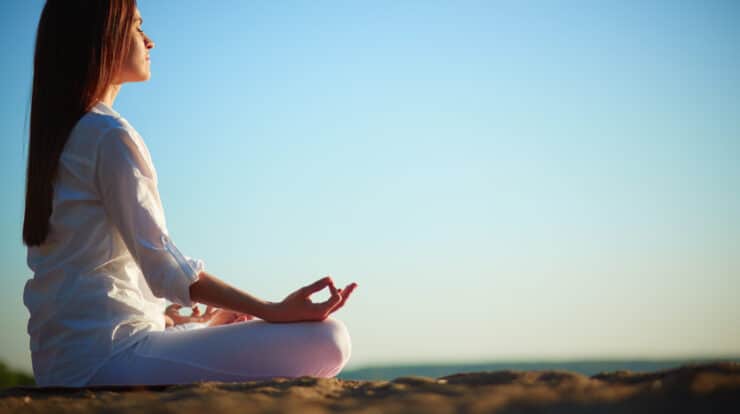
Are you aware of these 5 common myths about meditation? In this guide, we will explore the benefits of regular meditation practice, as well as provide tips and techniques to help you establish a daily meditation routine. Whether you are a beginner or have some experience with meditation, this guide aims to provide you with the tools and knowledge to incorporate meditation into your busy life.
Benefits of Regular Meditation Practice
Regular meditation practice has numerous benefits for both the mind and body. It can help reduce stress and anxiety, improve focus and concentration, increase self-awareness and emotional intelligence, enhance creativity and problem-solving skills, promote better sleep quality, and overall enhance your well-being. With our busy lives, it is easy to get caught up in the chaos and forget to take care of ourselves. Meditation provides an opportunity to take some time out to recharge and reset.
Creating a Daily Meditation Routine
To establish a daily meditation routine, it is important to set aside the same time every day to meditate. This could be first thing in the morning before work or right before bed. Make it a non-negotiable part of your schedule and stick to it as much as possible. Over time, you will begin to notice the positive effects of regular meditation practice on your physical and mental health.
Finding the Right Guided Meditations for You
Guided meditations can be helpful when starting out with meditation or when feeling overwhelmed. There are many free resources available online such as YouTube videos, podcasts, and apps. Look for guides that resonate with you and speak to your needs. Some may focus on relaxation techniques while others may incorporate visualization or mantra repetition. Experiment with different types until you find what works best for you.
Setting Up a Home Meditation Space
Creating a dedicated space at home for meditation can help create a sense of peace and tranquility. Start by finding a quiet space where you won’t be disturbed. Clear clutter and ensure the area is clean and organized. Add soft lighting like candles or fairy lights and use calming colors like blues and greens. Hang artwork or photos that inspire you and place a small rug or mat underfoot to make it more comfortable. By creating a serene environment, you can enhance your meditation experience.
How to Get Started with Meditation?
Getting started with meditation doesn’t have to be complicated. Find a comfortable position that works best for you, sitting with your back straight and hands resting in your lap. Close your eyes or focus on a spot in front of you. Begin by taking deep breaths in through your nose and exhaling slowly through your mouth. Use either your breath or a guided meditation as your focal point. If your mind starts to wander, gently bring your attention back to your breath. Remember to not judge yourself too harshly if your mind wanders – simply enjoy the moment and the process.
Common Myths About Meditation Debunked
There are common myths surrounding meditation that may discourage some from giving it a try. One myth is that meditation requires hours of practice each day or that one needs to become a monk to reap its benefits. In reality, meditation can be practiced anywhere, anytime, and only takes a few minutes per day to experience positive effects. Another myth is that meditation will make you feel more anxious or depressed. However, meditation actually helps release negative thoughts and emotions, allowing us to feel lighter and happier.
Meditation is a practice that can bring about immense benefits for our mental, emotional, and physical well-being. By incorporating regular meditation practice into your daily routine, you can reduce stress, improve focus, and enhance your overall quality of life. So why wait? Start meditating today and discover the transformative power of this ancient practice.

What is Meditation?
Meditation is a practice that involves focusing your attention on a particular object, thought, or activity to achieve a state of calmness and relaxation. By sitting quietly with your eyes closed, repeating a mantra, or focusing on your breath, you can quiet the mind and reduce stress levels.
Many people believe that meditation requires hours of practice each day or that they need to become a monk to experience its benefits. However, this couldn’t be further from the truth! Meditation can be practiced anywhere, anytime, and only takes a few minutes per day. Another common myth is that meditation will make you feel more anxious or depressed. In reality, meditation helps to release negative thoughts and emotions so that we can feel lighter and happier.
To get started with meditation, you don’t need any special equipment or clothing. Find a quiet space where you won’t be disturbed and get into a comfortable position that works best for you. Close your eyes or focus on a spot in front of you, and begin by taking deep breaths in through your nose and exhaling slowly through your mouth.
If your mind starts to wander, gently bring your attention back to your breath. Try not to judge yourself too harshly if your mind wanders during meditation; simply enjoy the moment and refocus on your breath.
Setting up a dedicated space at home for meditation can create a sense of peace and tranquility. Clear clutter and make sure the area is clean and organized. Add soft lighting like candles or fairy lights and hang artwork or photos that inspire you. Use calming colors like blues and greens, and place a small rug or mat underfoot to make it more comfortable.
Regular meditation practice has numerous benefits such as reducing stress and anxiety, improving mood, increasing self-awareness and emotional intelligence, better sleep quality, and improved cognitive function. It can also lower blood pressure, improve immune system function, and reduce symptoms of depression and chronic pain.
To establish a daily meditation routine, try to set aside the same time every day to meditate. Make it a non-negotiable part of your schedule and stick to it as much as possible. Over time, you’ll begin to notice the positive effects of regular meditation practice on your physical and mental health.
Meditation is a simple and accessible practice that offers a range of benefits for busy people. By creating a daily meditation routine and finding a comfortable space at home, you can experience reduced stress, improved focus, better sleep, and enhanced overall well-being. Give yourself permission to take a few minutes each day to recharge and reset through the practice of meditation.
Why Should You Start Meditating?
The Benefits of Meditation
Meditation is not just for monks or those with ample free time; it is a practice that anyone can incorporate into their busy lives. Despite common misconceptions, meditation does not require hours of practice each day. In fact, just a few minutes of daily meditation can have significant benefits for your overall well-being.
Regular meditation practice offers a wide range of benefits, including reduced stress and anxiety, improved mood, increased self-awareness and emotional intelligence, better sleep quality, and enhanced cognitive function. Scientific studies have also shown that meditation can lower blood pressure, improve immune system function, and reduce symptoms of depression and chronic pain. By taking a few moments each day to meditate, you can experience these positive effects and create a sense of calmness and relaxation in your life.
Escaping the Chaos of Everyday Life
In our fast-paced and hectic world, it is easy to become overwhelmed and forget to prioritize self-care. Meditation provides a valuable opportunity to step back from the chaos and recharge your mind and body. By focusing your attention and quieting your thoughts, you can find a sense of peace and tranquility amidst the busyness of your daily routine.
Establishing a Daily Meditation Routine
To make meditation a regular part of your life, it is helpful to establish a daily routine. Set aside the same time every day to meditate, whether it’s first thing in the morning before the hustle and bustle of the day begins or right before bed to unwind and prepare for restful sleep. Treat this time as non-negotiable and commit to it as much as possible. Over time, you will start to notice the positive effects of regular meditation practice on your physical and mental health.
Finding Guided Meditations That Work for You
Starting out with meditation can be challenging, especially if you feel overwhelmed or unsure of where to begin. Guided meditations can be incredibly helpful in providing structure and support during your practice. There are many free resources available online, such as YouTube videos, podcasts, and apps, that offer guided meditation sessions. Explore different options and find guides that resonate with you and address your specific needs. Whether it’s focusing on relaxation or incorporating visualization techniques, experiment with different types of guided meditations until you discover what works best for you.
meditation is a powerful practice that offers countless benefits for both your physical and mental well-being. By dedicating just a few minutes a day to this practice, you can reduce stress, improve focus and concentration, enhance self-awareness, and promote overall wellness. So why not start meditating today and experience the positive impact it can have on your life?

Finding a Quiet Space
To begin your meditation practice, it’s important to find a quiet space where you won’t be disturbed. This could be a corner of your room, a designated area in your garden, or any place where you can have a few minutes of uninterrupted solitude. Clear the clutter and create an environment that promotes relaxation and focus. Make sure the area is clean, organized, and free from distractions.
Choosing a Comfortable Position
Next, find a comfortable position that works best for you. You can sit cross-legged on a cushion, on a yoga mat, or even on a chair with your feet on the ground. Keep your back straight and your hands resting gently in your lap, allowing your body to feel relaxed and supported.
Focusing on Your Breath
Begin your meditation by closing your eyes or fixing your gaze on a spot in front of you. Take deep breaths in through your nose, and exhale slowly through your mouth. Focus your attention on the sensation of your breath entering and leaving your body. If your mind begins to wander, gently bring your attention back to your breath, without judgment or frustration.
Setting a Timer
To keep track of time, set a timer for 5-10 minutes, depending on your preferences and availability. Having a timer allows you to fully immerse yourself in the meditation without worrying about the clock.
Exploring Guided Meditations
If you’re new to meditation or find it difficult to stay focused, guided meditations can be extremely helpful. From YouTube videos to smartphone apps, there are a plethora of free resources available online. Explore different options and find a guide that resonates with you and speaks to your specific needs. From relaxation techniques to visualization exercises, there are various forms of guided meditation. Experiment with different types until you discover what works best for you.
Establishing a Daily Routine
To make meditation a consistent habit, establish a daily routine. Choose a specific time each day to meditate, whether it’s in the morning before work or right before bed. Treat it as a non-negotiable part of your schedule and prioritize it. Over time, you’ll begin to experience the positive effects of regular meditation practice on your physical and mental well-being.
By following these simple steps, you can embark on your meditation journey and embrace the numerous benefits it offers. Take a few moments each day to recharge, find inner peace, and rejuvenate your mind and body. Start your meditation practice today and experience the transformative power it has to offer.
Regular meditation practice offers a multitude of benefits for busy individuals like you. By incorporating meditation into your daily routine, you can experience reduced stress and anxiety, improved focus and concentration, increased self-awareness and emotional intelligence, enhanced creativity and problem-solving skills, better sleep quality, and overall improved wellbeing.
In today’s fast-paced world, it is easy to become overwhelmed and neglect our own self-care. Meditation provides an opportunity for you to take a break from the chaos and recharge yourself. By dedicating a few minutes each day to quieting your mind and focusing inward, you can find a sense of calm and clarity amidst the busyness of life.
5 Common Meditation Myths Debunked
Contrary to common myths, meditation does not require hours of daily practice or a monastic lifestyle. It can be practiced anywhere and anytime, even in short bursts of a few minutes. You can start by finding a quiet space where you won’t be disturbed, adjusting your posture to a comfortable position, and focusing your attention on your breath or a particular object. Don’t worry about how long you’ve been meditating – simply enjoy the present moment.
If you’re starting out with meditation or feeling overwhelmed, guided meditations can be of immense help. You can find a range of free resources, including YouTube videos, podcasts, and apps, that offer guided meditations tailored to various needs. Whether you prefer relaxation-focused meditations or those incorporating visualization techniques, explore different options until you find what resonates with you.
Creating a dedicated space for meditation in your home can further enhance your practice. Consider decluttering the area, hanging artwork or photos that inspire you, and using calming colors like blues and greens. Adding soft lighting, such as candles or fairy lights, and a small rug or mat can also contribute to a tranquil environment.
To establish a daily meditation routine, try to set aside the same time every day for your practice. Make it a non-negotiable part of your schedule, whether it’s in the morning before starting your day or right before bed. Over time, you’ll reap the benefits of regular meditation practice on both your physical and mental health.
Remember, meditation is a journey, and there’s no need to judge yourself harshly if your mind wanders during the practice. Simply gently bring your attention back to your breath and continue with your meditation. By committing to regular meditation, you can cultivate a sense of calmness and balance that permeates your daily life. Start your meditation today and embark on a path towards improved wellbeing.

Myth 1: Meditation requires hours of daily practice or becoming a monk.
Many people believe that meditation requires a significant time commitment or a complete lifestyle change. However, this is far from the truth. Meditation can be practiced in short sessions that only take a few minutes each day. You don’t need to dedicate hours or become a monk to experience its benefits. Incorporating even brief moments of meditation into your daily routine can make a significant difference in your overall well-being.
Myth 2: Meditation will make you feel more anxious or depressed.
Some individuals worry that meditation will exacerbate their anxious or depressed feelings. In reality, meditation is a powerful tool for releasing negative thoughts and emotions. By focusing your attention on the present moment and quieting the mind, meditation helps to reduce stress and promote a sense of inner peace. It allows you to let go of worries and find clarity and calmness within yourself.
Myth 3: It’s essential to maintain a perfectly clear and focused mind during meditation.
It’s common for thoughts to arise during meditation. Your mind may wander, and you may find it challenging to stay fully present. However, it’s important not to judge yourself harshly for these distractions. Instead, gently redirect your focus back to your breath or chosen point of attention. Over time, with regular practice, you will develop a greater ability to maintain focus and experience deeper meditation sessions.
Myth 4: Meditation requires a special spiritual or religious affiliation.
Meditation is a practice that can be embraced by people of any religious or spiritual background. It is not limited to a specific belief system. Whether you follow a particular faith or consider yourself spiritual but not religious, meditation is a tool that can be adapted to suit your individual needs and preferences. It is a practice that focuses on cultivating inner peace and self-awareness, regardless of your religious or spiritual affiliations.
Myth 5: Meditation is too difficult for beginners.
Beginning a meditation practice may seem daunting, especially if you’re unsure of where to start or if you’ve tried it before without success. However, meditation is a skill that can be developed with patience and practice. There are many resources available, such as guided meditations, apps, and instructional videos, that can provide step-by-step guidance for beginners. Remember, the key is to approach meditation with an open mind and to be gentle with yourself as you navigate the process.
By debunking these common myths, it becomes clear that meditation is accessible to anyone willing to give it a try. It doesn’t require extensive time commitments, religious beliefs, or prior experience. Meditation provides a valuable opportunity to cultivate inner peace, reduce stress, and enhance overall well-being, making it an essential practice for busy individuals looking to find balance in their lives.
Tips for Effective Meditation
When you first start meditating, it’s helpful to set a timer for 5-10 minutes. This will give you a structured timeframe to focus on your practice without constantly checking the clock. As you become more comfortable with meditation, you can adjust the timer to suit your needs.
To fully immerse yourself in meditation, it’s important to find a quiet space where you won’t be disturbed. Choose a room or corner in your home where you can have some privacy and peace. This will create an environment conducive to relaxation and concentration.
Using Guided Meditations
Guided meditations can be a great tool for beginners or those who struggle with staying focused. There are plenty of free resources available online, such as YouTube videos, podcasts, and meditation apps. Find guides that resonate with you and address your specific needs, whether it’s relaxation, stress relief, or personal growth.
Focusing on the Breath
A common technique in meditation is to focus on the breath. This helps anchor your attention and brings you into the present moment. Take deep breaths in through your nose and exhale slowly through your mouth. If your mind starts to wander, gently redirect your focus back to your breath.
Be Gentle with Yourself
During meditation, it’s normal for your mind to wander, and thoughts to arise. Instead of judging yourself for these distractions, practice self-compassion and gently bring your attention back to your breath or chosen point of focus. Remember, meditation is a practice, and it takes time and patience to cultivate a calm and focused mind.
To reap the full benefits of meditation, it’s essential to establish a daily practice. Set aside a specific time each day, whether it’s in the morning before starting your day or in the evening before bed. Treat meditation as a non-negotiable part of your schedule, just like brushing your teeth. Consistency is key in developing a regular meditation habit.
By following these tips, you can enhance the effectiveness of your meditation practice and experience its multitude of benefits. Remember, meditation is a personal journey, so don’t be afraid to experiment and find what works best for you. With dedication and patience, you can incorporate meditation into your busy life and find inner peace and tranquility.

Conclusion
In conclusion, meditation is a simple yet powerful practice that can have numerous benefits for busy individuals. By setting aside a few minutes each day to focus your attention and quiet your mind, you can experience reduced stress and anxiety, improved emotional well-being, better sleep quality, and enhanced cognitive function.
To get started with meditation, find a comfortable position in a quiet space where you won’t be disturbed. You can add soft lighting and calming colors to create a peaceful atmosphere. Set a timer for 5-10 minutes and begin by taking deep breaths, focusing on your breath or using a guided meditation if needed. If your mind starts to wander, gently bring your attention back to your breath.
Remember that meditation can be practiced anywhere, at any time, and you don’t need to meditate for hours to experience its benefits. It’s also important to debunk common myths about meditation, such as the belief that it requires extensive practice or that it can make you feel more anxious or depressed. In reality, meditation is a tool for releasing negative thoughts and emotions, allowing you to feel lighter and happier.
By incorporating regular meditation practice into your daily routine, you can cultivate a greater sense of calmness, improve your overall well-being, and navigate the busyness of life with greater ease. So take some time for yourself, establish a dedicated space for meditation, and begin reaping the benefits of this simple yet transformative practice.




